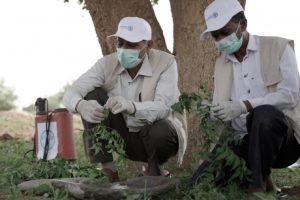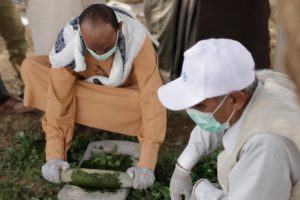It was a sad day when Ali Abdoul from Al-Buniyah, Yemen turned the leaf of his sorghum crop and saw a worm. This loathed pest is not just any worm, it is the so-called Fall armyworm that attacks many crops, with a clear preference for maize, and ruins livelihoods in a growing number of countries worldwide.
This pest made its way to the Taiz Governorate in July 2018, adding additional misery to Yemeni farmers, who were already grappling with a litany of challenges.
“For us farmers, pests are a menace as they devour crops…. In Yemen, pesticides are now very costly. We sometimes have to sell some crops from the previous harvest to get money to buy pesticides and save the current crop,” said Ali.
Many other farmers in Yemen share Ali’s sentiments. About 70 percent of Yemenis live in rural areas and depend heavily on agriculture as a critical source of food and income. The eight-year conflict in the country has worsened the situation and the prices of farming inputs have shot up.
In addition to rising input costs, farmers have faced a shortage of critical agricultural necessities such as seeds and fertilizer, a sharp increase in the price of fuel and unpredictable weather patterns.
And now they had Fall armyworm.
Ali describes how farmers were desperate to manage the new pest and tried different control methods without success. Home mixtures weren’t effective, and chemical pesticides caused harm to the environment and agricultural soils.
It was at this time when they were still struggling with the new pest that Ali, together with other farmers, started attending farmer field schools (FFS) organized by the Food and Agriculture Organization of the United Nations (FAO).


